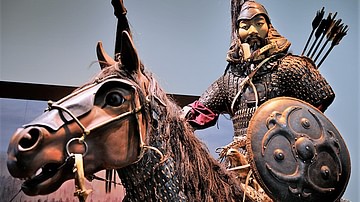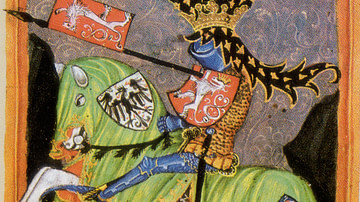Search
Did you mean: Epona?
Search Results

Definition
Roman Gladiator
A Roman gladiator was an ancient professional fighter who usually specialised with particular weapons and types of armour. They fought before the public in hugely popular organised games held in large purpose-built arenas throughout the Roman...

Definition
John Locke
John Locke (1632-1704) was an English philosopher responsible for laying the foundation of the European Enlightenment. Locke believed that each branch of government should have separate powers, that liberty must be protected from state interference...

Definition
Golden Age of Piracy
The Golden Age of Piracy (1690-1730) refers to a period when robbery on the high seas and at colonial ports reached an unprecedented level. Although not all historians agree on the precise time frame, it is generally applied to those pirates...

Definition
Mongol Warfare
The Mongols conquered vast swathes of Asia in the 13th and 14th century CE thanks to their fast light cavalry and excellent bowmen, but another significant contribution to their success was the adoption of their enemies' tactics and technology...

Definition
Medieval Jousting
Jousts were, from the 13th to 16th century CE, a popular part of the European medieval tournament where knights showed off their martial skills by riding against one another with wooden lances in a designated area known as the lists. The...

Definition
Ancient Egyptian Warfare
The Narmer Palette, an ancient Egyptian ceremonial engraving, depicts the great king Narmer (c. 3150 BCE) conquering his enemies with the support and approval of his gods. This piece, dating from c. 3200-3000 BCE, was initially thought to...

Definition
Egyptian Empire
The Egyptian Empire rose during the period of the New Kingdom (c. 1570- c. 1069 BCE), when the country reached its height of wealth, international prestige, and military might. The empire stretched from modern-day Syria in the north to modern-day...

Definition
German-Soviet War - WWII's Bloodiest Front
The German-Soviet War, known in the USSR and today's Russia as the Great Patriotic War or, in Western Europe, as the Eastern Front of the Second World War (1939-45), began in June 1941 with Operation Barbarossa and ended in Germany's total...

Definition
U-Boat - Germany's Submarines of WWI & WWII
The U-boat, short for Unterseeboot (undersea boat), was the name for submarines used by the German Navy during the First World War (1914-18) and Second World War (1939-45). In the two Battles of the Atlantic, U-boats sank thousands of ships...

Definition
Celtic Warrior
The warriors of Celtic Europe were amongst the most distinctive of any fighters in the ancient world. With their great height, long hair and moustaches, frequent nakedness, painted and tattooed bodies, and fondness for collecting enemy heads...